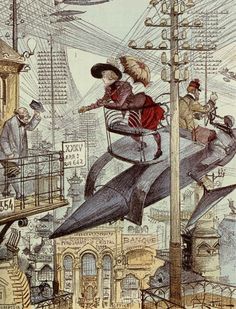The good folks at The Public Domain Review, that excellent thing, unearthed an 1857 piece of writing from the illustrated magazine The Leisure Hour which predicted what London would be like a hundred years in the future. It’s a drunken, utopic vision of a fogless, crimeless metropolis, but the best of the article is a prediction of things akin to Internet shopping and social networking. Technology was to deliver a global village. An excerpt:
Some of these shops were vast magazines of wealth, covering wide areas, and perfectly dazzling with the splendour of their contents. The purchaser walked through long galleries, where, ranged in orderly array, glittered and gleamed the gold, the gems, the jewels of every clime. Some were as rich in works of pictorial or fictile art; and some, again, had inexhaustible stores of intellectual wealth. Books on all subjects, and which seemed, from the abundance of their illustrations, to speak as much to the eye as to the mind, abounded in inconceivable stores in these repositories; and every household, however humble, had its family library, and, what was better still, its family of readers. I observed that from each of these district shops innumerable electric wires branched off in all directions, communicating with several houses in the district to which it belonged. Thus, no sooner did a house-keeper stand in need of any article than she could despatch the order instantaneously along the wire, and receive the goods by the very first railway carriage that happened to pass the store. Thus, she saved her time, and she lost no money, because all chaffering and cheapening, and that fencing between buyer and seller, which was once deemed a pleasure, had been long voted a disgraceful, demoralizing nuisance, and was done away with. The electric wires ran along the fronts of the houses near the upper stories, crossing the streets at an elevation at which they were scarcely visible from below; and I noticed that the dwellings of friends, kindred, and intimates were thus banded together, not only throughout the whole vast city, but even far out into the provinces, and, in cases where the parties were wealthy, to the uttermost limits of the realm.
One result of this extended social intimacy and sympathy was pleasingly apparent. The old walls of separation which had formerly shut out rich from poor and poor from rich, had crumbled beneath it, and were fast falling to decay.•

